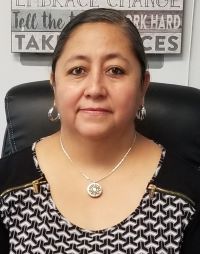Latinx Leader Spotlight: Martina Rocha
This spotlight highlights Latinx early childhood leader Martina Rocha, founder of the Together for Childhood Network. The Together for Childhood Network is a not-for-profit organization that provides resources and trainings in Spanish and English for early childhood educators, childcare providers, parents and community members.
 Martina Rocha founded the Together for Childhood Network 15 years ago in the basement of her Lake County, Illinois home. Present at that first meeting were more than a dozen other child care educators who, like Rocha, had immigrated to the United States. Her goal in starting the network was to ensure these providers didn’t have the same problems she had encountered running a business, complying with regulations, and getting credentials.
Martina Rocha founded the Together for Childhood Network 15 years ago in the basement of her Lake County, Illinois home. Present at that first meeting were more than a dozen other child care educators who, like Rocha, had immigrated to the United States. Her goal in starting the network was to ensure these providers didn’t have the same problems she had encountered running a business, complying with regulations, and getting credentials.
“When I started my day care…it was not easy to find resources, information, or a way to complete the process [of getting a license in Spanish],” Rocha told the Lake County Journal in 2011. “The first two years in this business, I was just losing money because I wasn’t sure what I was doing. Taking care of kids, sometimes [the parents didn’t] pay me; I [didn’t] have any contracts – I was just trying to work. But [I wasn’t] taking care of the business part, only providing good child care. And then I [thought], this is a business…it’s important to do [both parts]. That’s why I said, if I go with this business, I can help anyone who wants to do the same thing.”
Since that first meeting, Rocha has helped more than 400 family care providers, many of them Spanish speaking, earn a CDA. She also has provided trainings to hundreds more on complying with state licensing, health, and safety certifications, and building a customer base to run a small business.
Through its in-person and virtual meetings in Round Lake Park, Together for Children now also serves as hub for providers, parents, and community members to discuss early childhood development, nutrition, early literacy, and other topics. Prior to the network’s establishment, providers would have had to travel to Chicago to get that kind of information and support. Today, nearly 250 providers belong to the Together for Children Network. The network serves providers from various counties in Illinois, not just Lake County. Currently the network counts members from nine different states – people who all want to take the training and classes offered.
In a 2018 profile of Rocha, the Council for Professional Recognition noted her outreach to Latino entrepreneurs. Maria Lopez, the Latino program director for the Women’s Business Development Center (WBDC) in Chicago, said: “She’s probably the only one that is a community leader within the child care industry up in Lake County for the Spanish-speaking entrepreneurs. She’s always bringing in educational tools…I find that’s pretty unique because they don’t have to travel down to Chicago to receive that support.” In 2010, the WBDC awarded Rocha its Child Care Activist Award for helping child care providers get the support they need to succeed.
In an interview with BUILD, Rocha said lack of resources for families and providers in the Latino community remain, and whether she can fill those gaps is a major concern.
“As a Latina Leader in the community for more than 14 years, I am always in search of resources and activities for families, but one of the biggest concerns that keeps me up at night is not having support from people. We do many free activities and programs for the community but there are not always funds or money to do them, I don’t have the experience to find resources, and I don’t know the right person who can help me. I always worry about that.”
The most important lesson Rocha said she would share with others as a Latino is:
“Never give up. If one door closes, I try to open another door, asking for support. We can help people to make a positive change in their lives and, by looking for the right people, we can empower ourselves and work together as a team for the well-being of our families and society.”
Explore More
Collaborative Leadership and Power Lessons on Authentic Family and Community Partnerships
Video June 20, 2024
During this one-hour webinar, hosted in partnership with Vital Village Networks, you’ll witness the limitless wisdom and leadership that lives in our communities. Hear about best practices and lessons learned from prenatal-to-three (PN3) coalitions across the country that are working to shift and share power with parents and community partners. We’ll explore what it looks like to build trust and relationships while redesigning what it means to lead together for the health and wellbeing of our children.

Family Engagement
Report June 13, 2024
Family engagement at the state and local level is an essential component of high-quality, inclusive early childhood care and education (ECCE) programs and systems. Engaging families as partners during the early years allows parents and caregivers to establish strong connections that support their children’s development, well-being, and achievement long term.
Ideas for Incorporating Strategic Financing Efforts into Your PDG B5 Application
Report June 13, 2024
This resource outlines ideas for incorporating strategic financing efforts into your PDG B-5 application.
